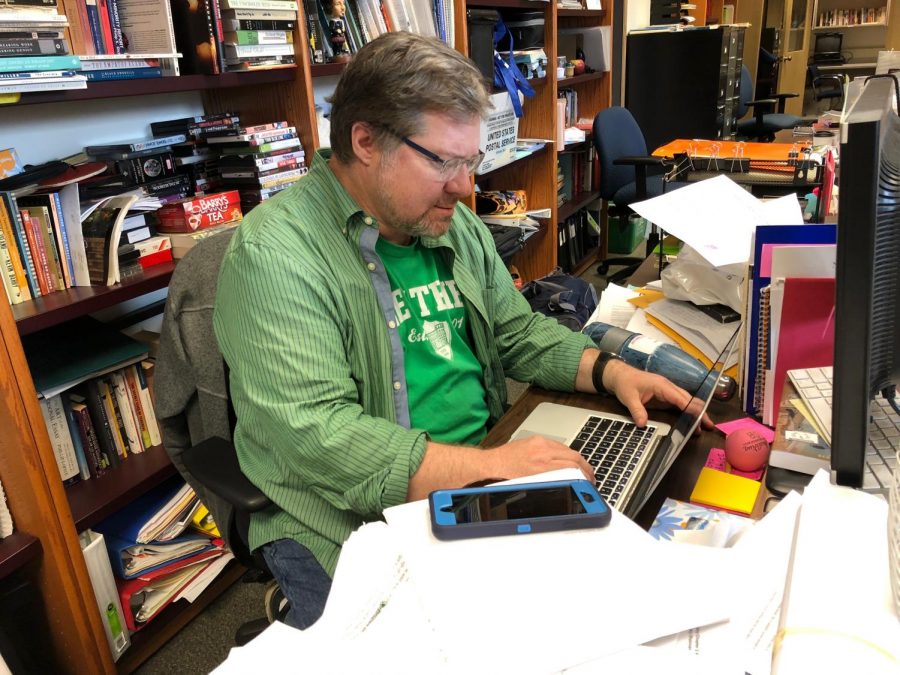Teacher nominated for Best New Podcast award
O’Connor explores student-teacher relationships through podcast
English teacher John O’Connor was recently named a finalist by Headline Club for the Best New Podcast award for Schooled, his education-related podcast that gives an insider perspective on the relationship between students and teachers in the classroom.
The Chicago Headline Club is one of the largest Society of Professional Journalists chapters in the nation; the awards recognize Chicago’s most prominent journalists and are named after Peter Lisagor, the Chicago Daily News’ Washington bureau chief from 1959-1976.
The Chicago Headline Club’s 41st Annual Peter Lisagor Awards were held on Friday, May 11 at the Union League Club of Chicago.
Though he didn’t win the award, O’Connor was surprised and honored to be named a finalist for it.
“It was really cool and surprising, and made me rethink the whole enterprise.”
The idea for this podcast came naturally to O’Connor, an avid podcast listener himself: he’s taught for over thirty years and has written a lot about teaching.
When initially talking about this project with his friends and colleagues, he referred to it as the imaginary podcast. It soon manifested into a platform that discussed the “disconnection between scholarship in education, particularly at the university and research level, and the actual lives of schools,” said O’Connor.
The podcast has been praised for his warm voice, his tactful questions, and his willingness to listen to his interviewee’s responses. On the description page on iTunes for his podcast, a customer review wrote that “His use of music and other aural elements, coupled with excellent editing, make this a pleasure every time. This is one of the best education-related podcasts out there.”
The second episode, “Politics in the Classroom,” approaches the touchy discussion of the place of politics inside and outside of a class. Elementary education theorist Bill Ayers and teacher at Martin Luther King School Jashen Edwards are featured in this episode.
Around the time this episode was made, the University of Chicago had sent a letter to incoming students warning them that teachers would not give students trigger warnings.
Additionally, O’Connor said that “right around then, Edwards was attempting to use the song “Amazing Grace” in his classroom in Evanston, but was told that it was too political for young students.
I thought the question “when is something too political?” was really interesting. Isn’t that a part of the job of a school, to get students to think about their values and assumptions?”
The fourth episode, Where Have All the Teachers Gone, considers the lack of teachers in today’s society and why teachers are choosing to work in different professions.
“The idea for this really grew out of an article I read in Harper’s Magazine by Garret Keizer. He had been a teacher and took time off to be a writer, and when he returned to the classroom found that it was impossible to stay as a teacher. It had become too bureaucratic and too standardized. At the same time, I had read an article in an education journal that featured the work of a Michigan State professor and she was studying why teacher resignation letters were going viral,” said O’Connor.
The next episode, which came out May 11, is about the idea of neuro-diversity, the belief system that celebrates differences in people. According to O’Connor, “It’s a way of looking at the world where you don’t see ADD or dyslexia as problems, but as differences that may be accommodated for in different ways.”
It’s this genuine and comfortable discussion that has prompted him to become a finalist for the Headline Club’s Best New Podcast.
Despite the accomplishment of becoming a finalist, O’Connor’s response to his nomination reflects his modest and humble character.
He made sure to emphasize his thankfulness for those around him who support this project.
In O’Connor’s words, “I feel really lucky that there is so much talent around, that so many people are interested in these ideas. I wasn’t consciously trying to do journalism. We saw it as a way of starting conversations and bringing voices into contact with each other that hadn’t previously been talking. But I guess that is journalism.”








































